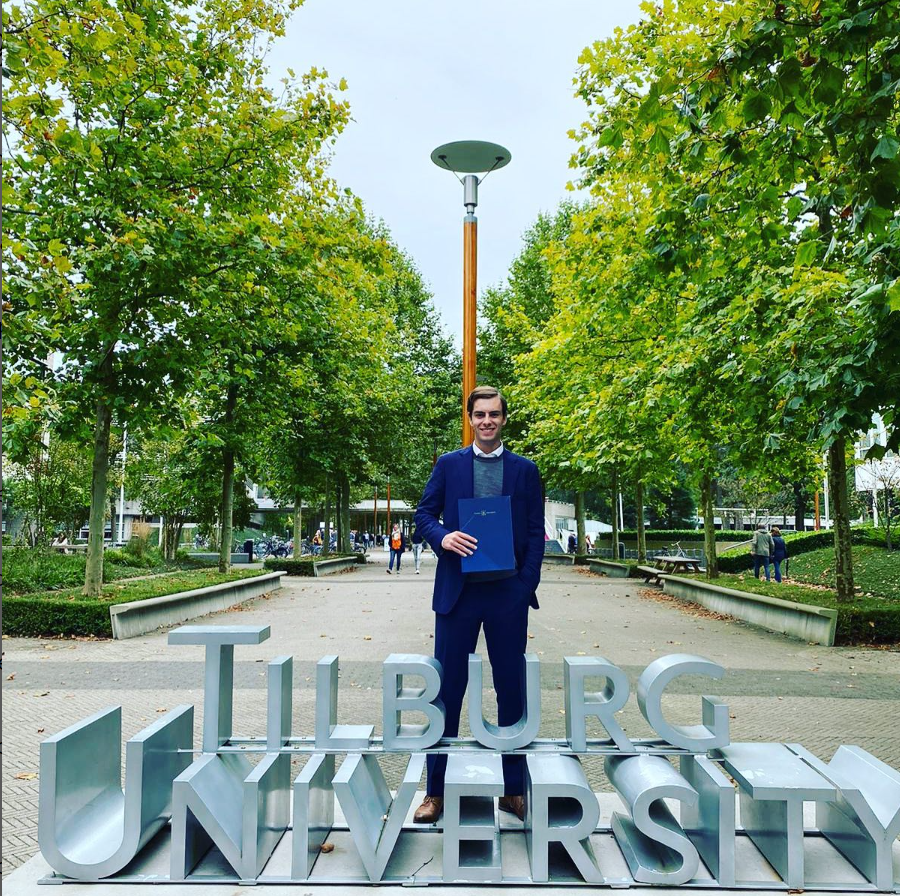Who are you?
I am Jasper Vreman, 23 years old and raised in Oud Gastel. In 2018 I started my bachelor’s degree in Business Economics in Tilburg, which I completed in 2021. Then I did both the master’s in Accountancy and Finance, also at Tilburg University. After completing both masters, I joined QVO Values, a start-up in corporate valuation, on September 1, 2023.
What was graduation like?
In 2021, I first started my master’s degree in Accountancy. I pretty much completed this master’s in the first year, except for one subject. In order to avoid paying a huge fee for the second master, you should not yet complete your first master. Therefore, I chose to leave one subject open. The master’s in Accountancy is special because you do not write a thesis, but an MSc File. Here, the thesis is divided into three parts, so to speak: the Business Application, the Replication Study and the Research Note. This divides the workload of one large thesis over an entire year. The Research Note is the largest “project,” and I wrote it under the supervision of KPMG in Rotterdam. I would recommend writing the Research Note with an employer to anyone to get a sense of your possible future work environment and what work is involved in the accountancy profession. All in all, I liked the setup of the MSc File, however, you now have a whole year of guilt if you prioritize social activities over an afternoon in the UB.
The Finance master’s did require writing a full thesis. In January, I decided to apply for a research project within the thesis: here a group of thesis writers share the same direction, in my case inflation hedging, and that way you can help each other by sharing knowledge and tips. Also, you get a supervisor who is at home in this topic, which can help tremendously in thesis writing. With the help of my supervisor Rik Frehen, I experienced the whole thesis process as pleasant, with an 8 as the icing on the cake!
What was the job search like?
The serious job search started with a LinkedIn message, in which I mentioned that I had completed both masters and was looking for a job in Finance. I then sincerely received more than 100 responses from recruiters. Many messages were from secondment and interim finance firms, but of course many accounting firms sent messages as well. However, there was one message that stood out, from Henk Oosterhout. He stated that he was embarking on a new adventure: a start-up in corporate valuation. Now valuation was exactly what I was looking for: a lot of analytical thinking, but also a social touch through contact with clients. I then called Henk while I was still on vacation in South Africa. The first click was very good, and we decided to have a ‘formal’ job interview in Leiden, on the terrace. Here the initial suspicion was confirmed, and I subsequently started on September 1.
What is it like working at QVO Values?
Currently I have been working at QVO Values for more than four months and I am still enjoying it immensely. The great thing about a start-up is that you get to experience all aspects of the ins and outs of founding the company. For example, in the first month I got to give a valuation workshop for the tax and accounting reporting division of an AEX fund. Furthermore, giving guest lectures at the VU and RSM is of course unique. Because we would like to grow, we obviously need to hire more analysts. The nice thing about this is that Henk and I do the job interviews together. That way we can complement each other with questions for the applicant or information about QVO Values.
What else do you do?
Actually, apart from the start-up work, the work can be divided into three parts: modeling, deepening and appointments. Modeling very simply means developing models for valuation work. Because we are just starting out, we have to start completely from scratch. Although developing models may not sound very sexy, it does ensure that you get a better understanding of the models that you will then use in the future. In that way, I can say that I have learned an enormous amount in the past four months. Furthermore, delving deeper is mainly researching our customers and their competitors to get a better understanding of the customer, or an entire industry. Figures, of course, only tell part of the story: a low gross margin for a supermarket is not so crazy, but for a pharmaceutical company it is. Therefore, it is important to understand the company and its industry well. The last facet is agreements: the data supplied by our clients is sometimes incomplete or raises questions. To resolve the noise then, we have appointments to ask our questions. Furthermore, our results are checked by, for example, an audit firm or the tax authorities. If they then have questions, we also provide explanations in an appointment.
















